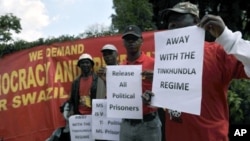Swaziland’s attorney general has dismissed opposition demands for democratic reforms, saying the campaign lacks strong local support.
Majahenkaba Dlamini said the government would not kowtow to pressure from self-interest groups to work outside the confines of the constitution.
He also said the groups are unsure about what they really want.
“They don’t want to play in accordance [or] with the terms of the environment that they find themselves,” said Dlamini. ”They want to lay down the rules for everybody, and it doesn’t look like they are in a position to do that.”
Dlamini’s comments came after hundreds of striking teachers presented petitions to the South African and the American embassies in the country. They call on both Washington and Pretoria to urge Swaziland’s government to implement democratic and economic reforms.
The attorney general said the groups’ demand is a publicity stunt to gain international community support.
“They don’t have that much support internally,” said Dlamini. “Their real strength lies outside the country [and] not inside the country and that is their weakness.”
He said the pressure groups have also failed to use the constitution as a platform to engage the administration.
Prime Minister Barnabas Sibusiso Dlamini recently presented an austerity budget that would freeze salaries of government workers for the next three years.
In response, civil society groups, labor unions as well as the officially banned People's United Democratic Movement have demanded more democratic and economic reforms.
Muzi Mhlanga, secretary-general of the Swaziland Association of Teachers (SNAT), said his organization wants the American and South African governments to freeze the assets of senior Swazi officials.
He also said his organization wants the Southern African Development Community (SADC) to influence the Swaziland government to embrace multi-party democracy.
“We requested [South Africa’s] President [Jacob] Zuma to put Swaziland on the agenda for democratization,” said Mhlanga.
He said his organization also petitioned the South African government to refuse medical care for members of the Swaziland government, their spouses as well as their children.
“Our hospital and medical care in this country is very poor, and because most of these people go to South Africa to seek medical attention,” he said.
Swaziland’s constitution was ratified in 2006, but the king holds executive, legislative and judicial powers.




